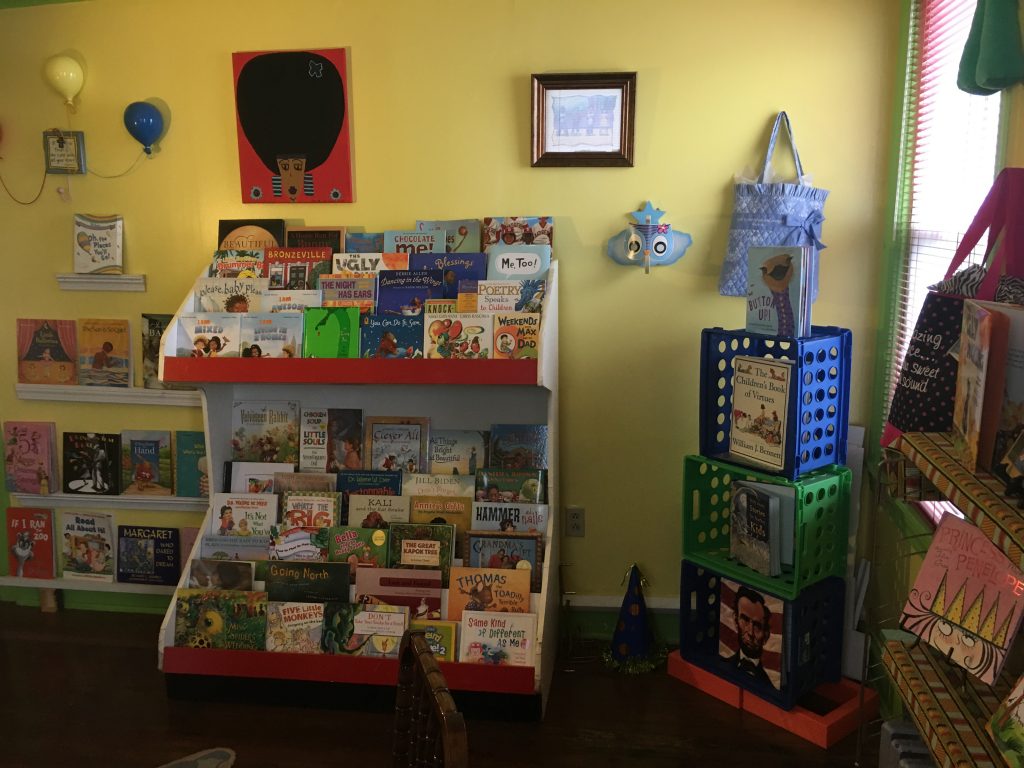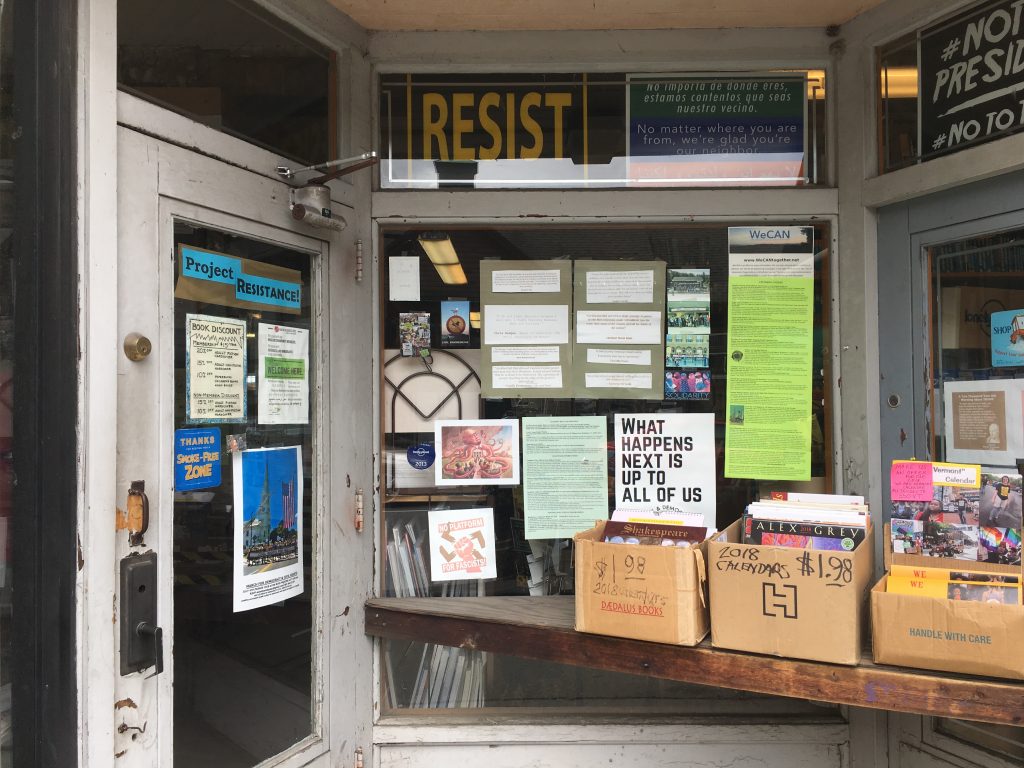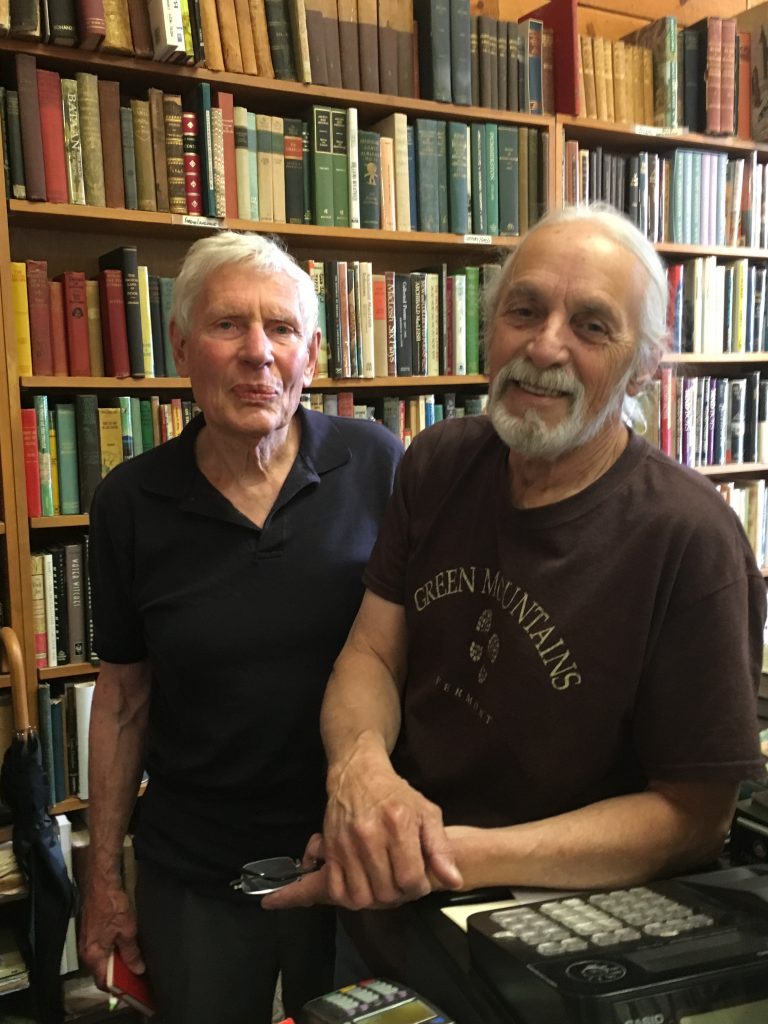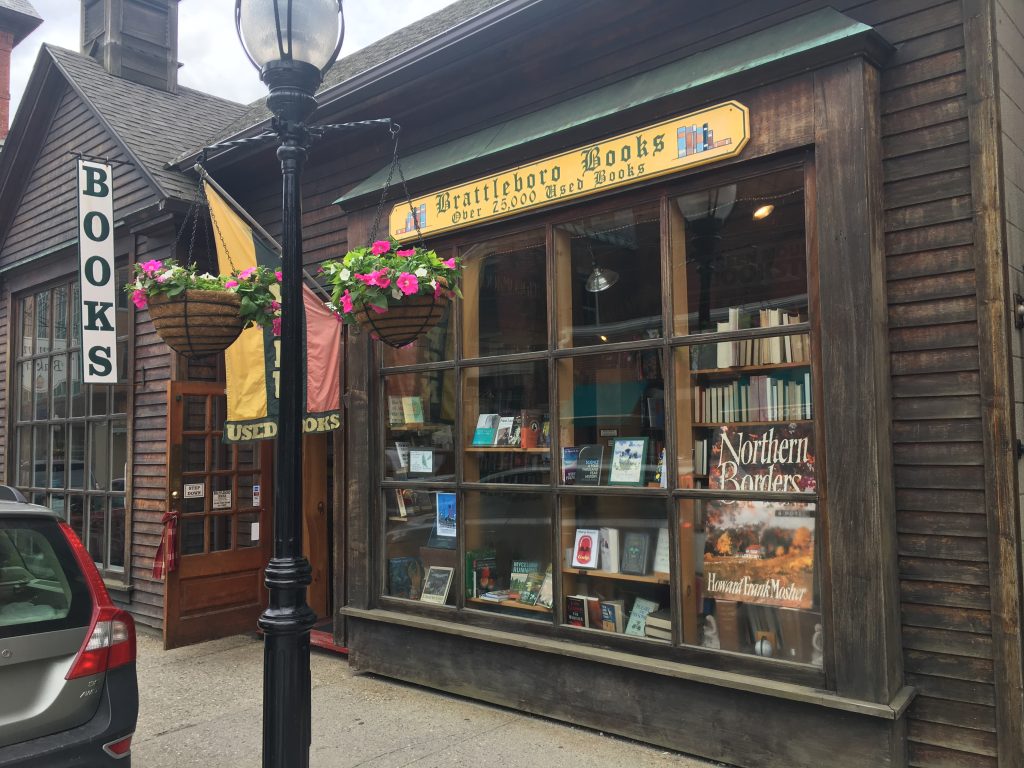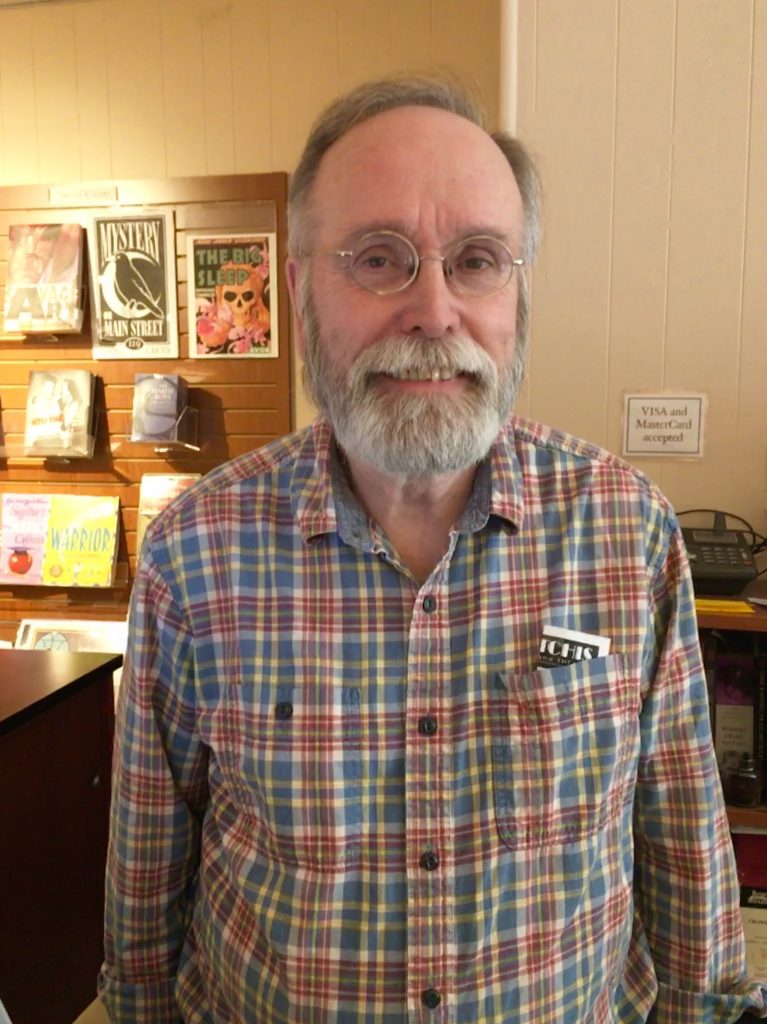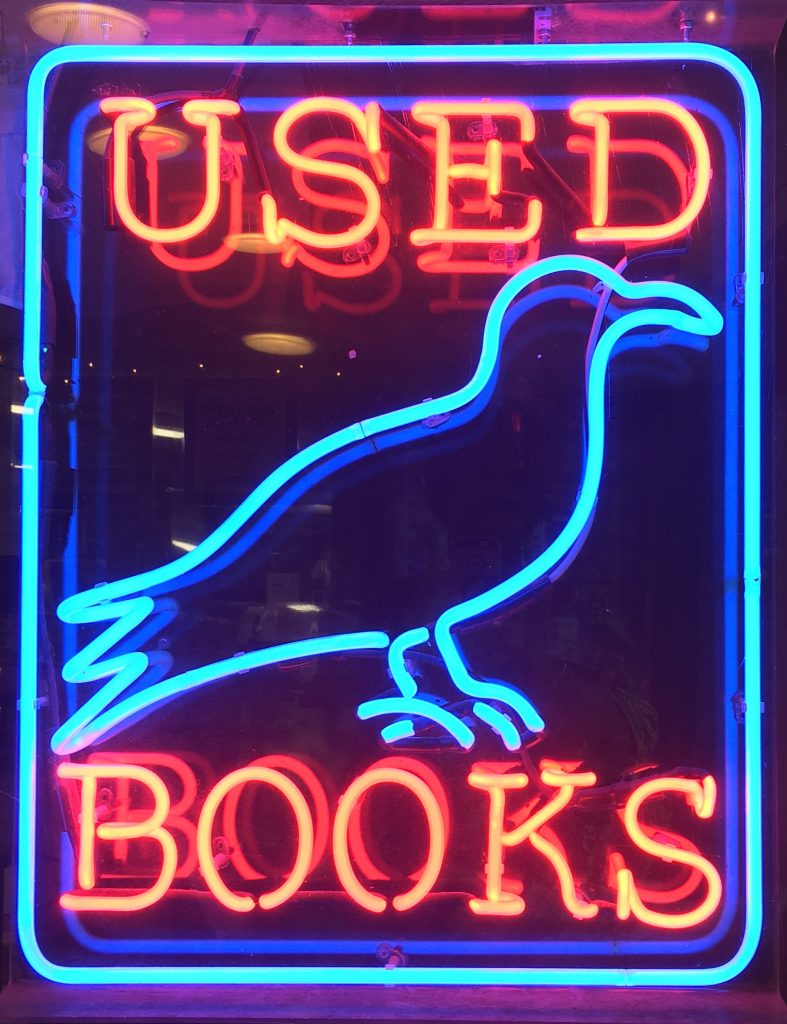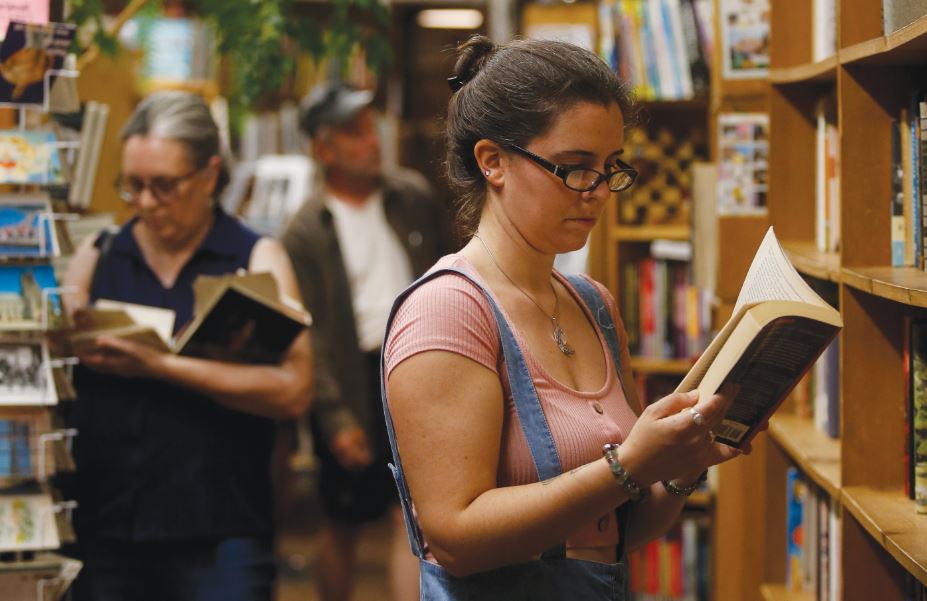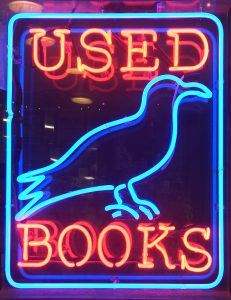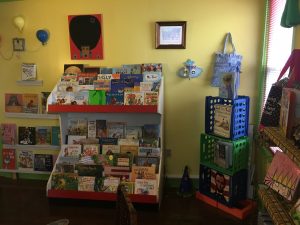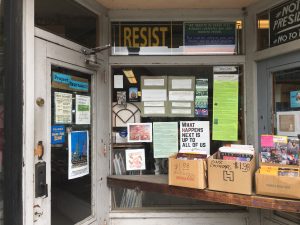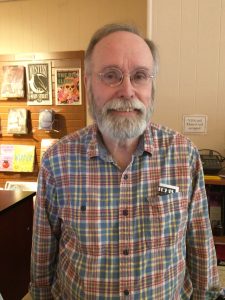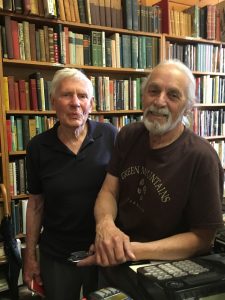Raven Books in Northampton is the quintessential New England used bookstore. Winding stacks of books create a delightful maze that loops in and out of corners. There doesn’t seem to be a square inch of wall that remains unoccupied, and tables of books, live plants, and suspended artifacts makes for a satisfying and unique browsing experience.
Raven’s owner Betsy Frederick publishes a simple trifold brochure called Bookstores of the Pioneer Valley. It’s a wealth of information and a surprisingly full list. It includes “the largest, most popular independent bookstores, used & new in western Massachusetts and southern Vermont.”
“It was actually Kris’ idea,” Frederick says looking at manager Kristopher Severy.
Severy sits at a small desk in a nook to the right of the cash wrap. He pokes his head out to explain how he came up with the idea. “People would stop in and they were always complaining that their bookstores were closing down. I just wanted to say ‘look, this area has over 20 bookstores.’”
“And it brings people to the area,” Frederick interjects. “We thought that if we could consolidate everything, it makes a bigger draw.”
Brattleboro, Northampton, and Greenfield each have four independent bookstores, and cities and towns throughout Western Mass have at least one new or used bookstore nearby.
The American Booksellers Association (ABA), a nonprofit trade association dedicated to the promotion of independent bookstores, reports, “between 2009 and 2015, more than 570 independent bookstores opened in the U.S.” That was a 40 percent increase after more than a decade of decline. It’s now estimated that there are over 2,300 independent bookstores operating in the United States.
But it hasn’t been an easy road. Raven Books, Broadside Books, The Old Bookstore, and those that have been in business for 25 years or more have been tested more than once. From big box bookstores, Amazon, and e-readers, these, and independent bookstores across the country, have weathered a few storms.
The use of e-readers has fallen in stature and one of the last big bookstores, Barnes and Noble is now restructuring after 11 straight years of falling sales. It’s a curious trend, but Severy considers the reasons as to why this may be the case.
“[Barnes and Noble] stopped selling books and they even tried to destroy the book when they released the Nook, and when that didn’t work out, they didn’t have the book market anymore. But all we have is books, we have some other things, but we’ve just been pushing books the whole time.”
Barnes and Noble, however, is in the process of redefining their place in the market. According to Forbes Magazine, the retailer, which has lost a larger than expected share of the book market to Amazon and Walmart, will open five new stores in fiscal year 2019.
“They will be far smaller than existing locations and will feature fewer non-book entertainment offerings,” Forbes reports. Which means Barnes and Noble will be better able to counter Amazon’s brick and mortar operations. But perhaps more importantly, they will return to basics and once again focus on selling books.
But independent bookstores are able to remain flexible; some sell not only books but also cards, clothing, and a host of other items. Olive Tree Books-n-Voices, an independent bookstore cum meetinghouse in the heart of Springfield’s Mason Square neighborhood, sells a wide array of merchandise, or what is called “sidelines.”
Olive Tree is a converted seven-room brick and white vinyl sided house that sits on a stretch of Hancock Street that is zoned for mixed use residential and commercial buildings.
Mason Square’s population is predominantly African-American; it sits just northeast of the city’s metro center. It’s a hardscrabble neighborhood and struggles with its fair share of blight and generational poverty. But the community is tight and there are many who are dedicated to championing the people and the culture.
Olive Tree proprietor Zee Johnson is one of those champions. Johnson is sweet and affable, but there’s a hint of no-nonsense in her demeanor. On a Saturday afternoon, she sports a pale yellow V-neck with the name of her store and sits politely behind the cash wrap. She smiles warmly when customers enter.
Walking into Olive Tree is like walking into someone’s home. There’s the soft smell of scented candles, and local radio programming serves as ambient noise. Johnson herself presents more like a beloved aunt than a store owner.
But the cheerful goldenrod walls at Olive Tree are covered with merchandise rather than personal effects. Johnson says there are over 500 titles in her store, and the plethora of front-facing Afrocentric books and peripherals leave little doubt as to the niche her bookstore fills.
Olive Tree Books-n-Voices and Red Brick Books are the only two independent bookstores in the city of Springfield. Olive Tree, however, is the only bookstore that caters to African-Americans in the Pioneer Valley. This distinction is not lost on her patrons.
“It’s like a jewel in the city,” Springfield resident Leo Foster says. “I come here to get books for my granddaughters, to get cards, or to talk to Zee. Or anybody who’s in here. It’s a place where folks come together and talk about life.”
In her 14th year in business, Johnson, like many other independent bookstore owners in the Valley, recognizes the need and importance for communal spaces, and she considers herself more than just a bookseller.
“It’s about selling history, self identity, self-confidence, and empowerment in this neighborhood,” she says. “It’s about all those things you don’t get at Barnes and Noble.”
Rise and fall of the big box bookstore
Indeed, Johnson’s statement summarizes the decades long war between big box bookstores and independent bookstores, for independent bookstores are the cultural antitheses of corporations like Barnes and Noble. That’s not to say these big box bookstores didn’t have an allure.
As a child in the 1970s growing up in Cleveland, I remember the epic rise of urban sprawl, shopping malls and bookselling giants. Once thriving downtown businesses were shunned, bigger was becoming better, and by the 1980s, any hint of provincialism was unacceptable at best and derided at worst.
For the first time in my life, disparate ethnic neighborhoods throughout the city were forced to shop together. And Randall Park Mall (which for a time was the biggest mall in the world) afforded a large swath of Greater Clevelanders the chance to shop under the skylight of a hermetic indoor downtown main street, complete with trees, brick flooring, fountains, and playgrounds.
Besides ubiquitous storefronts like Orange Julius, Radio Shack, and Hickory Farms (of Ohio), Waldenbooks and B. Dalton Booksellers became the neighborhood bookstores. And in the wake of our shifting loyalties, the number of independent bookstores declined precipitously.
In 1995, independent booksellers were dealt another blow when Amazon opened its virtual doors. The “Earth’s biggest bookstore” boasted on its primitive landing page: “One million titles, consistently low prices.” The American Booksellers Association reports the number of independent booksellers fell 40 percent in five years as people opted to do to their book shopping online.
But something interesting happened in 2007: The digital e-book — in particular Amazon’s Kindle — was launched, and although analysts predicted the demise of the printed word, they were in for a surprise.
The Association of American Publishers cited a decline in e-reader sales of nearly 20 percent over the first nine months of 2016, But more compelling is that although bookselling superstores like Borders (which closed in 2011) fell victim to consumer vagaries, independent bookstores began gaining ground.
“When the e-book first came out, there was a big dip,” Frederick says of Raven’s sales. “It happened at the same time Amazon started selling used books, too. And then it leveled off and then it started to go back up again ….”
Roxie Mack is an owner of Broadside Books on Main Street in Northampton. Broadside deals only in new books, but her experience with the advent of e-readers was similar to Frederick’s.
“I think we were more afraid that we would see a greater impact by e-books than what actually happened,” Mack said. “Even at the peak of that business, a number of people felt that they wanted to hold a physical book ….”
Nancy Braus, co-owner of Everyone’s Books in Brattleboro offers another theory. “There are a number of people who may have thought the initial Amazon boom was exciting, but they’ve learned things about Amazon which has them saying ‘well, maybe low cost is not the most important thing in life.’”
That’s not to say some businesses weren’t affected significantly by these changes. Jessica Mullins, owner of World Eye Bookstore in Greenfield saw her sales drop 18 percent between 2015 and 2016. She was forced to downsize her store in order to stay open.
“The industry has changed…,” she said in a 2017 interview. “People are apparently buying more books online either in electronic or physical form. Consumer habits have …. changed.”
Mullen chose to combine World Eye Bookstore with Magical Child Toy Store, and although she lost quite a bit of square footage, she’s managed to keep the doors open. World Eye remains Greenfield’s only independent new bookshop.
Although the ABA’s report on the surge in the number of independent bookstores came as a surprise to most of the independent booksellers I spoke to, there was unanimous consensus as to why independent bookstores survive.
“They’re a reflection of the community because most independent bookstores really have a connection to the community. It’s not about just selling books; it’s personal,” Zee Johnson says. And Braus agrees. “We’re going to continue doing what we do well, which is personalized service, be friendly to people …. be a human space for people ….”
Independents in the Pioneer Valley and beyond
Harvard Business School professor Ryan Raffaelli is studying the resurgence of independent bookstores in the U.S.
Raffaelli says, “I think … [independent bookstores] … had the ability to adapt and reactivate some of the values that … may have been muted in a race towards trying to have the cheapest and largest inventory.”
David Wilson owner of Mystery on Main Street in Brattleboro, however, reasons more pragmatically. “Once we lost Walden and Borders, it was a little bit easier to make a living.”
Mystery on Main Street is a small shop in Brattleboro center. “We’re all mystery books so we’ve become a destination store from Connecticut and Massachusetts. All the other mystery book stores are gone; you have to go to Manhattan.”
On a Sunday afternoon, the windows of Mystery on Main Street are reminiscent of Halloween: A skeleton dressed as the Grim Reaper and a Ouija Board are just two of the props that welcome visitors. The kitschy window display, however, belies Wilson’s savvy curation and the store’s impeccable layout.
And although Wilson is bemused by reports of a surging increase in independent bookstore business, his bookstore is in its 12th year and is holding steady.
The exclusivity of Mystery’s genre has landed the bookshop on the list of “One of the Best Independent Bookstores in New England” by Yankee Magazine. It’s also a testament to the power of carving out a well-themed niche. Like Johnson’s Olive Tree Books-n-Voices, Wilson’s inventory reflects his personal interests.
Raven Books owner Frederick, however, credits variety as a key factor in its survival.
“A lot of times Barnes and Noble gets locked into just the latest things that come out. You haven’t sold a Moby Dick in five years, so you don’t have it on the shelf and then the inventory starts to shrink and shrink …. They focus everything on the new and then they lose variety, diversity.”
Henry Walz, owner of The Old Bookstore in Northampton, explains why two such differing models can both succeed.
“ …Bookstores are really good about sending people from store to store. It’s not one of those dog eat dog businesses like some industries are. We’re real good about sending people back and forth from store to store.”
That camaraderie and cooperation is highly prized, especially when, in a small city like Northampton, four stores may share the same small pool of customers.
“We all help each other,” Frederick contends. “We’re all different. If [Walz] doesn’t have a book, I may have it. So if someone wants that book and we have it, it’s no skin off his back to say ‘go to the Raven, they might have it.’ And if it’s a new book, we send them to Broadside.”
Brattleboro’s independent bookstores share limited real estate, as well. Everyone’s Books, Brattleboro Books, Mystery on Main Street, and Baskets Bookstore are, in some cases, feet from each other, but all of them are holding their own.
Nancy Braus of Everyone’s Books is excited about the surge in numbers.
“There are independent bookstores opening. Fifteen years ago, I never would have believed it.”
However, Michael Tenney, owner of Brattleboro Books which sits directly across the street, questions whether independent bookstores are truly on the upswing.
“I don’t know if they really are,” he says skeptically. “Some of it is a reaction to the big box stores closing. Other stores have come in — often the ones who were pushed out when the big box stores came in. A lot of it is just a changing of the guard.”
But he concedes, “we’ve always had a lot of bookstores here. For a town with 12,000 people, we have four full time bookstores and all are relatively healthy.”
Tenney’s store is a beautiful brown wood shake building on Elliot Street that could easily be mistaken for a shop on Martha’s Vineyard. The name “Brattleboro Books” is printed in a medieval script on a bright yellow sign that also reads, “Over 25,000 Used Books.”
A smattering of customers are perusing Tenney’s books; Alan Armstrong, of Hatfield, is among them. Armstrong, once a longtime bookseller himself, frequents Brattleboro Books because of its surprising selection. That Sunday he was hoping to find a copy of 1421: The Year China Discovered America, by Gavin Menzies. Having found it, he places it on the counter and says gleefully, “This place is a miracle.”
“I’ve been in business for 25 years, I’ve owned a new bookstore and I’ve owned a used bookstore,” Tenney says. When asked which he prefers, without hesitation he declares used books his favorite.
“They’re a lot more fun. You have a new bookstore, they expect everything that’s on the New York Times Best Seller list. In a used bookstore, there’s so much serendipity. I’m not going to order anything to keep it on the shelf — if it’s here, it’s here; if it’s not, it’s not.”
Bookstores that deal new titles, however, offer other perks. The Odyssey Bookshop in South Hadley hosts over 125 author events every year. They also have the First Editions Club through which members receive a signed first printing of a newly published book.
Mack of Broadside Books, says, “we do events, but we stick to local authors. I think some readings are more lucrative than others but it’s not about the bottom line, it’s about them having an experience.”
The experience Mack speaks of is the taking part in a gathering and being part of a wider community. Indeed, community is at the heart of the success of an independent bookstore. Both Broadside Books and The Odyssey are heavily involved in their surrounding communities.
Nancy Braus says Everyone’s Books, which also deals in new books, had its beginnings as a place to service the community. In 1984 they opened the space to be used by activists; it eventually evolved into a bookstore.
“Some people are more about putting their bodies on the line, other people want to write about and talk about it,” Braus says. “I’m really happy to be able to use our space for where people can get stickers, pins, T-shirts, cards. All kinds of things that express their opinions.”
Ryan Raffaelli’s study on the surge and success of independent bookstores states, the “successful bookstores use a three pronged approach: local events, a carefully curated selection of merchandise, and local appeal.”
Certainly local appeal and community access are keys to the thriving body of independent bookstores in this part of the world. Where big box bookstores failed, small booksellers continued to do what they do best: serve their communities.
Independent bookstores are also reflections of their local communities; they connect with customers on a personal level, and purchasing a book becomes an act of community-building and civic investment.
Nancy Braus explains, “There are people who are excited about walking into a place where a lot of ideas are expressed freely and they can come in and have a conversation about the things that are happening in the world, in their lives, and what they’re reading.”
Back in Springfield, Leo Foster tells me about his promise to a fifth grade class to buy each of them one book from Zee Johnson’s Olive Tree Books-n-Voices if they stopped by.
“…I told the teacher, ‘if you can get 20 or 30 — whatever the number is, I’m still going to pay for the book.’ Hopefully that’s something that’s going to happen by the end of this month or maybe next month. Because that’s something I’m trying to instill in our community: Use what’s around your corner.”
The Valley’s Independent Bookstores:
Amherst
Amherst Books – New and Used: 8 Main St.
Brattleboro
Baskets Bookstore – Used Books: 48 Harmony Place
Brattleboro Books – Used Books: 36 Elliot St.
Everyone’s Books – New Books: 25 Elliot St.
Mystery on Main Street – New Books: 119 Main St.
Easthampton
White Square – Fine Books and Art: 86 Cottage St.
Florence
Bookends – Used: 80 Maple St.
Greenfield
Federal Street Books – Used: 8 Federal St.
John Doe, Jr. – Used Records and Books: 269 Main St.
Roundabout Books – Used: 26 Kenwood St.
World Eye Bookshop – New: 134 Main St.
Hadley
Grey Matter Books – Used: 47 East St.
Troubadour Books – Used and Rare: 47 East St.
Montague
Montague Bookmill – Used: 440 Greenfield Rd.
Northampton
Booklink Booksellers – New and Gifts: 150 Main St.
Broadside Bookshop – New: 247 Main St.
Gabriel Books – Antiquarian: 21 Market St.
The Old Bookstore – Used: 32 Masonic St.
Raven – Used Books: 4 Old South St.
Shelburne Falls
Boswell’s Books – Used and New: 10 Bridge St.
Nancey L. Dole – Used and Ephemera: 20 State St.
Shelburne Falls Book Sellers – Used: 1 Deerfield Ave.
South Deerfield
Schoen Books – Used Judaica: 7 Sugarloaf St.
South Hadley
The Odyssey Bookshop – New and Used: 9 College St.
Southampton
Heritage Books – Used: 225 College Highway
Springfield
Olive Tree Books-n-Voices – 97 Hancock St.
Red Brick Books – Used: 97 Page Blvd.
Westfield
Blue Umbrella Books – Used and New: 2 Main St.
West Brookfield
Quaboag Book Shop – Used, rare and out of print titles: 80 W. Main St.
Gina Beavers can be reached at Gbeavers@valleyadvocate.com

